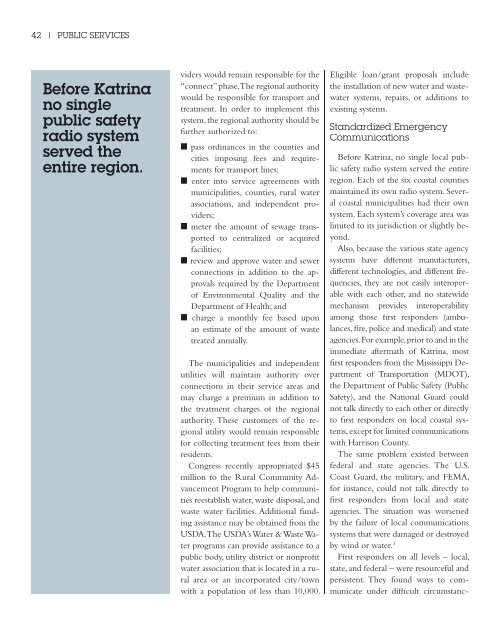Reports - Mississippi Renewal
Reports - Mississippi Renewal
Reports - Mississippi Renewal
- No tags were found...
You also want an ePaper? Increase the reach of your titles
YUMPU automatically turns print PDFs into web optimized ePapers that Google loves.
42 | PUBLIC SERVICESBefore Katrinano singlepublic safetyradio systemserved theentire region.viders would remain responsible for the“connect” phase. The regional authoritywould be responsible for transport andtreatment. In order to implement thissystem, the regional authority should befurther authorized to:■ pass ordinances in the counties andcities imposing fees and requirementsfor transport lines;■ enter into service agreements withmunicipalities, counties, rural waterassociations, and independent providers;■ meter the amount of sewage transportedto centralized or acquiredfacilities;■ review and approve water and sewerconnections in addition to the approvalsrequired by the Departmentof Environmental Quality and theDepartment of Health; and■ charge a monthly fee based uponan estimate of the amount of wastetreated annually.The municipalities and independentutilities will maintain authority overconnections in their service areas andmay charge a premium in addition tothe treatment charges of the regionalauthority. These customers of the regionalutility would remain responsiblefor collecting treatment fees from theirresidents.Congress recently appropriated $45million to the Rural Community AdvancementProgram to help communitiesreestablish water, waste disposal, andwaste water facilities. Additional fundingassistance may be obtained from theUSDA. The USDA’s Water & Waste Waterprograms can provide assistance to apublic body, utility district or nonprofitwater association that is located in a ruralarea or an incorporated city/townwith a population of less than 10,000.Eligible loan/grant proposals includethe installation of new water and wastewatersystems, repairs, or additions toexisting systems.Standardized EmergencyCommunicationsBefore Katrina, no single local publicsafety radio system served the entireregion. Each of the six coastal countiesmaintained its own radio system. Severalcoastal municipalities had their ownsystem. Each system’s coverage area waslimited to its jurisdiction or slightly beyond.Also, because the various state agencysystems have different manufacturers,different technologies, and different frequencies,they are not easily interoperablewith each other, and no statewidemechanism provides interoperabilityamong those first responders (ambulances,fire, police and medical) and stateagencies. For example, prior to and in theimmediate aftermath of Katrina, mostfirst responders from the <strong>Mississippi</strong> Departmentof Transportation (MDOT),the Department of Public Safety (PublicSafety), and the National Guard couldnot talk directly to each other or directlyto first responders on local coastal systems,except for limited communicationswith Harrison County.The same problem existed betweenfederal and state agencies. The U.S.Coast Guard, the military, and FEMA,for instance, could not talk directly tofirst responders from local and stateagencies. The situation was worsenedby the failure of local communicationssystems that were damaged or destroyedby wind or water. 3First responders on all levels – local,state, and federal – were resourceful andpersistent. They found ways to communicateunder difficult circumstanc-




